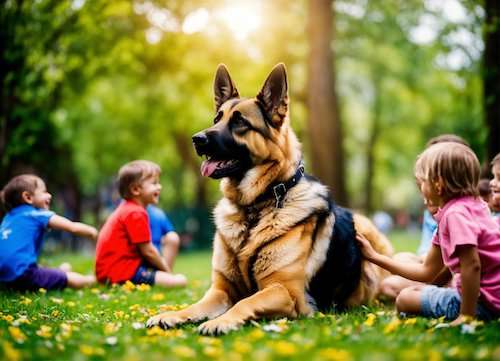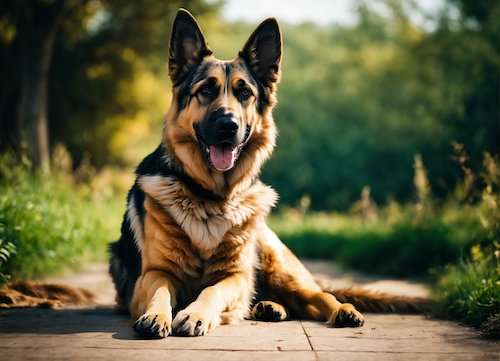The German Shepherd dog, also known as the police dog, is one of the most intelligent and loyal breeds in the world. With a rich history that begins as a herding dog in Germany, this breed has become a versatile and dedicated companion, playing important roles as police and service dogs.
In this guide, we will explore the main characteristics of dogs of this breed, including their appearance, temperament, and care needs. If you are considering getting one or simply want to learn more, you will find valuable information to make the most of your relationship with these amazing dogs.
Keep reading and discover why this breed is so loved by families and professionals around the world. With the right information, you will be ready to provide a loving and safe home for your future companion.
German Shepherd History

German Shepherd Dog have a rich history, initially bred for herding dogs in Germany. Their versatility led them to become police and military dogs, showcasing their exceptional intelligence and adaptability.
Captain Max von Stephanitz, the visionary behind the breed, aimed to create a working dog with unmatched intelligence, trainability, and loyalty. The breed’s distinct characteristics, including strength, agility, and a keen sense of smell, quickly gained recognition.
During World War I, German Shepherds showcased their exceptional skills as messenger dogs, search and rescue companions, and even guard dogs. Their bravery and adaptability solidified their status as one of the most revered breeds.
Post-war, their reputation soared globally, and they became popular not just as working dogs but also as loyal family companions. Today, the police dogs continue to leave an indelible mark as police and service dogs, excelling in various roles due to their unwavering devotion and unmatched abilities.
The history of these remarkable dogs is a testament to the enduring bond between humans and their canine counterparts.
German Shepherd Dog Appearance
The German Shepherd dog breeds appearance is a harmonious blend of strength, elegance, and functionality. These dogs boast a medium to large size, with a well-muscled body that exudes power and athleticism.
Their distinct double coat, which can be short or long, comes in a variety of colors, including the classic black and tan. One can’t help but be captivated by their expressive face, marked by alert ears that stand erect, showcasing their acute sensitivity to the environment.
The almond-shaped eyes hold a keen intelligence and warmth, establishing a connection that goes beyond words. The characteristic bushy tail and a strong, well-proportioned head add to their regal appearance.
German Shepherds dogs are a symphony of grace and purpose, with every aspect of their physicality designed to support their versatile roles. Whether as a loyal family companion or a dedicated working partner, their appearance reflects a harmonious balance between form and function.
White German Shepherds
The White German Shepherd is a captivating variation of the traditional German Shepherd breed, known for its stunning, all-white coat. While their appearance may differ from the more common tan and black coloration, their intelligence, loyalty, and versatility remain characteristic of the breed.
German Shepherd Personality
- Height: Adult males stand at 24 to 26 inches, while females range from 22 to 24 inches.
- Weight: Males weigh between 65 to 90 pounds, and females weigh 50 to 70 pounds.
- Life Span: German Shepherds generally live around 9 to 13 years.
The German Shepherd’s personality is a captivating blend of intelligence, loyalty, and versatility, making them one of the most beloved dog breeds. Renowned for their sharp intellect, German Shepherds are quick learners and thrive on mental stimulation.
Their loyalty knows no bounds, forming strong bonds with their families and often assuming protective roles.
Beyond their role as devoted companions, these dogs exhibit versatility in various roles, excelling as working dogs, police or military canines, and even loving family pets. While they are known for their protective nature, they also showcase a gentle and affectionate side, particularly with those they hold dear.
German Shepherds dogs are energetic and require regular exercise to keep both their bodies and minds engaged. Their alert and confident demeanor, coupled with a friendly disposition, make them excellent additions to households seeking a loving, intelligent, and reliable canine companion.
As social animals, they thrive on interaction and benefit from positive reinforcement in training. Transitioning from playful antics to a calm, watchful presence, the German Shepherd’s personality encompasses a rich spectrum that endears them to individuals and families alike.
German Shepherd Puppies

Considering the prospect of getting your first German Shepherd puppy to your family is a significant decision filled with excitement and important considerations. Before embarking on this journey, it’s crucial to assess your lifestyle and commitment level, as raising a puppy requires time, dedication, and care.
Researching the German Shepherd dog helps you understand their characteristics, needs, and compatibility with your living situation. Once you’ve decided that a German Shepherd is the right fit for you, prepare your home by puppy-proofing the environment and gathering essential supplies like a comfortable bed, nutritious food, and engaging toys.
Establishing a routine for feeding, potty breaks, and playtime is key to creating a structured and secure atmosphere for your new furry friend. Training and socialization are vital aspects of nurturing a well-behaved German Shepherd dog, and positive reinforcement methods can be highly effective.
Regular veterinary check-ups and vaccinations contribute to your puppy’s overall health and well-being. Embracing the joys and challenges of raising a German Shepherd puppy requires patience, love, and a willingness to learn.
Ultimately, the decision to bring a German Shepherd into your life promises years of companionship, loyalty, and shared adventures.
Nutritional Needs of German Shepherds: Crafting a Balanced Diet
Providing a balanced diet is essential for the well-being of your German Shepherd dog. A diet tailored to their age, size, and activity level ensures optimal health and vitality.
Ensuring the well-being of your German Shepherd puppy involves paying close attention to their nutritional needs. Crafting a balanced diet specifically suited to factors like their age, size, and activity level is crucial for fostering optimal health and vitality.
It’s not just about providing sustenance; it’s about curating a menu that nourishes their body and mind. Different life stages, from puppyhood to adulthood and senior years, come with distinct dietary demands. Understanding and addressing these nuances contribute to their overall health and longevity.
By tailoring their diet to their individual requirements, you’re laying the groundwork for a happy, healthy, and well-nourished companion. Transitioning between these life stages with a well-crafted diet ensures that your German Shepherd dog receives the nutrients necessary for sustained energy levels, healthy growth, and mental acuity.
Crafting a balanced diet becomes a proactive way to contribute to their overall well-being and happiness.
German Shepherd Grooming
Understanding their coat color variations and grooming needs is vital. Regular brushing, especially during shedding seasons, helps maintain their coat’s health and shine.
Now, exploring the world of German Shepherd dog grooming involves a keen awareness of their coat color variations and specific care requirements. These versatile dogs exhibit a range of coat colors, from classic black and tan to sable and solid black.
Regular grooming, with a particular emphasis during shedding seasons, plays a pivotal role in maintaining the health and luster of their coats. Brushing not only removes loose fur but also stimulates the skin, promoting overall well-being.
As these dogs are known for their double coat, comprised of a dense undercoat and a more protective outer layer, attentive grooming ensures a comfortable and happy German Shepherd.
This simple yet essential practice not only enhances their appearance but also strengthens the bond between these remarkable dogs and their human caretakers.
Harmony at Home and the German Shepherd: Nurturing Bonds with Children and Other Pets

German Shepherds dog, because of their protective instincts, they can be wonderful companions for families with children and other pets. Establishing harmonious relationships requires thoughtful socialization and understanding. Here’s a closer look at the family pet:
- Protective Nature: German Shepherds with their natural protective instinct, maks them attentive and caring towards children. With proper training and socialization, they can become a loyal and watchful playmate.
- Socialization from Early Age: Introduce your German Shepherd to children and other pets from an early age. This exposure helps them build positive associations and learn appropriate behaviors. Monitor these interactions to ensure a safe and comfortable environment.
- Supervision is Key: While German Shepherds are generally good with children, supervision is crucial, especially with younger kids. Teach children how to interact respectfully with the dog, avoiding behaviors that might make the dog uncomfortable.
- Positive Reinforcement: Reward your German Shepherd for calm and gentle behavior around children and other pets. Positive reinforcement encourages positive associations, reinforcing the idea that good behavior leads to positive outcomes.
- Training Commands: Basic obedience commands are valuable in managing interactions. Commands like “sit,” “stay,” and “leave it” can be handy in various situations, ensuring control and safety.
- Respect Individual Differences: Each dog and child is unique. Recognize and respect their individual personalities and boundaries. This understanding fosters a more profound connection and minimizes potential conflicts.
- Regular Exercise: Ensure your German Shepherd gets regular exercise to expend energy, making them more relaxed and less prone to restlessness or impatience around children and other pets.
Creating a harmonious environment with a German Shepherd involves patience, consistent training, and fostering positive associations. With proper socialization and care, your German Shepherd can become a cherished member of the family, forming strong bonds with children and other pets.
German Shepherd Dog Health Condition
Taking care of your German Shepherd’s health involves being mindful of potential weight gain issues and ensuring regular veterinary check-ups. These vigilant measures contribute to their overall well-being and longevity.
German Shepherds are prone to certain health conditions, and maintaining a healthy weight is essential for preventing issues like joint problems and obesity-related complications.
Regular veterinary check-ups enable early detection of any health concerns, allowing for prompt intervention and preventive measures.
As responsible pet owners, it’s crucial to provide a balanced diet, regular exercise, and mental stimulation to support their physical and mental health.
Understanding the specific health needs of German Shepherds, including their susceptibility to hip dysplasia and certain genetic conditions, empowers you to proactively manage their health and ensure a happy, active, and thriving life for your furry friend.
Potential For Weight Gain
These police dogs, like many breeds, have a tendency to gain weight, and this can have significant implications for their overall health. To ensure your German Shepherd dog stays in prime condition, it’s crucial to provide regular exercise and a well-balanced diet.
Lack of physical activity coupled with overfeeding can lead to weight-related issues, impacting their joints, overall mobility, and even their lifespan.
By incorporating daily walks, play sessions, and mental stimulation, you not only help them maintain a healthy dog’s weight but also contribute to their overall well-being.
Monitoring their diet, avoiding excessive treats, and providing nutritious meals tailored to their specific needs are key elements in preventing unwanted weight gain. A trim and fit German Shepherd not only looks good but is also more likely to lead a happy and active life.
Regular veterinary check-ups can further assist in assessing and managing their weight to ensure a long and healthy companionship.
German Shepherd Training

When training German Shepherd dogs, understanding their high sensitivity is paramount. Employing positive reinforcement and maintaining consistency are the cornerstone elements for effective training. Here’s a breakdown to guide you through:
- Sensitivity Level: German Shepherds are known for their heightened sensitivity to their owner’s cues and emotions. This makes positive reinforcement, such as treats, praise, or play, particularly effective. Harsh training methods can lead to stress and resistance, so a gentle and encouraging approach works best.
- Consistency is Key: German Shepherds thrive on routine and predictability. Consistent commands and expectations help them understand what is expected, building confidence and trust. Regular training sessions, preferably short and engaging, contribute to a positive learning experience.
- Obedience Training: Teaching basic commands like sit, stay, and come is fundamental. These commands not only enhance the safety of your dog but also strengthen the bond between you. Consistent rewards for desired behaviors reinforce the understanding that compliance leads to positive outcomes.
- Advanced Commands: As your German Shepherd progresses, consider introducing more advanced commands. These not only provide mental stimulation but also deepen the communication between you and your furry friend. Commands like heel, leave it, or recall are valuable for both their safety and your convenience.
- Socialization Skills: Beyond obedience, socialization is crucial. Exposing your German Shepherd dog to various environments, people, and other dogs helps them become well-rounded and confident. This early exposure is essential for preventing behavioral issues in the future.
German Shepherd Dog Breed Organizations
Explore breed organizations that focus on German Shepherds for valuable resources and support.
There are networks of breed organizations that can enhance your experience and knowledge. Here’s a guide to navigating this supportive community:
- The German Shepherd Dog Club of America (GSDCA): A leading authority, GSDCA provides a wealth of information on breed standards, health, and events. Membership offers access to a network of experienced breeders and enthusiasts.
- American Kennel Club (AKC): As the largest recognized dog breed registry, AKC offers resources specific to German Shepherds. Explore events, health initiatives, and connect with responsible breeders through their platform.
- United Schutzhund Clubs of America (USCA): If you’re interested in Schutzhund training, a discipline German Shepherds excel in, USCA is a valuable resource. They promote working abilities, character, and physical soundness.
- German Shepherd Rescue Organizations: Numerous rescues focus on German Shepherds, helping find homes for those in need. Organizations like the German Shepherd Rescue Alliance work tirelessly to rescue, rehabilitate, and rehome dogs.
- Local Breed Clubs: Many regions have local German Shepherd clubs. These clubs often host events, seminars, and training sessions. Connecting with local enthusiasts provides a community touchpoint and local resources.
- Online Forums and Communities: Platforms like the GermanShepherdForum.com or Reddit’s r/germanshepherds offer spaces for discussions, advice, and sharing experiences with fellow German Shepherd lovers.
- Educational Resources: Breed organizations often provide educational materials on topics like training, health, and responsible breeding. Take advantage of these resources to become a well-informed owner.
- Events and Competitions: Stay informed about events and competitions specific to German Shepherds. Participating or attending such events can deepen your understanding of the breed and connect you with like-minded individuals.
Found your perfect breed yet?

If you’re captivated by their traits, consider reaching out to reputable breeders or rescue organizations specializing in German Shepherds.
Reaching out to an experienced reputable German Shepherd breeder, ensures that you’re acquiring a herding dog from a trustworthy source, with a focus on health, temperament, and adherence to breed standards.
On the other hand, rescue organizations offer an opportunity to provide a loving home to a German Shepherd in need. Whether you opt for a breeder or rescue, it’s essential to do thorough research, ask questions, and visit the facilities to ensure a seamless integration of your new furry family member into your life.
Taking this step thoughtfully sets the stage for a fulfilling and lasting companionship with your perfect breed, the German Shepherd dog.
Conclusion
In conclusion, the German Shepherd is a remarkable breed, combining intelligence, loyalty, and versatility. Understanding their history, appearance, nutritional needs, grooming, temperament, health, and training is key to fostering a fulfilling relationship with these incredible dogs. Plus, they make a wonderful pet for children.
Frequently Asked Questions (FAQ) about German Shepherd Dogs
Q1: What is the origin of the German Shepherd breed?
The German Shepherd dog breed originated in Germany during the late 19th century. Captain Stephanitz was given credit for developing the breed, emphasizing intelligence, strength, and versatility.
Q2: What is the typical temperament of a German Shepherd?
German Shepherds are known for their loyalty, intelligence, and protective instincts. Often seen as confident, courageous, and adaptable, making them excellent family companions and working dogs.
Q3: Are German Shepherds good with children?
Yes, German Shepherds can be great with children when properly socialized and trained. They are often protective and form strong bonds with their human family members.
Q4: Do German Shepherds require a lot of exercise?
Yes, German Shepherds are an active and energetic breed. Exercise every day is crucial to keep your dog not only physically but mentally stimulated as well. walk every day, playtime, and engaging activities are recommended.
Q5: What is the average lifespan of a German Shepherd?
The average lifespan of a German Shepherd is typically between 9 to 13 years. Providing proper nutrition, healthcare, and regular vet check-ups can contribute to their longevity.
Q6: Are German Shepherds easy to train?
Yes, German Shepherds are known for their intelligence and eagerness to learn. With proper training techniques, positive reinforcement, and consistency, they can excel in various commands and activities.
Q7: Do German Shepherds shed a lot?
Yes, German Shepherds have a double coat that sheds throughout the year. Regular grooming, especially during shedding seasons, helps manage their coat and reduces shedding.
Q8: Are there specific health concerns for German Shepherds?
German Shepherds may be prone to hip dysplasia, elbow dysplasia, and certain genetic conditions. Responsible breeding and regular veterinary check-ups can help address and prevent health issues.
Q9: Can German Shepherds live in apartments?
While German Shepherds can adapt to apartment living with sufficient exercise and mental stimulation, they thrive in environments with ample space and outdoor access.
Q10: How can I find a reputable German Shepherd breeder?
To find a reputable breeder, research local breeders, ask for recommendations, and ensure they prioritize the health and well-being of the dogs. Consider adopting from rescue organizations as well.

